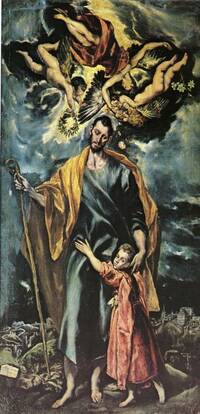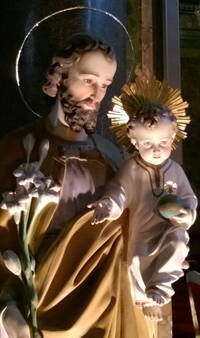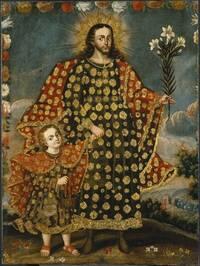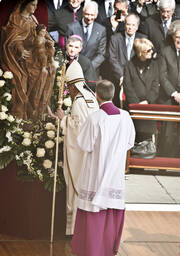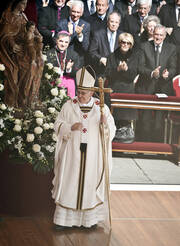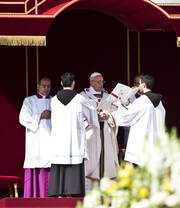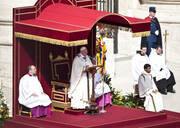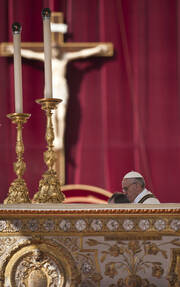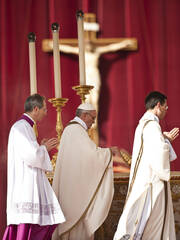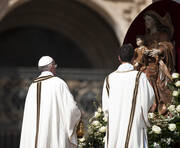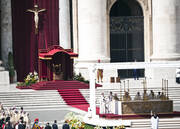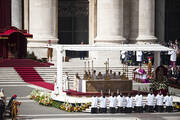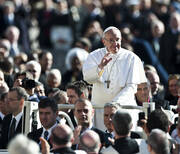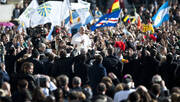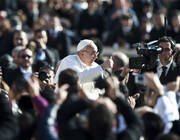Saint Joseph
Husband of Mary, Foster Father of Jesus, Patron of the Church.
St Joseph has 2 special feast days:
Solemnity of St Joseph, Husband of Mary - 19 March
Feast of St Joseph the Worker - 1 May
Pope Leo XIII wrote his encyclical Quamquam Pluries on Devotion to St Joseph. St John XXIII wrote his apostolic letter Le Voci on the Protection of St Joseph for Vatican II.
St John Paul II wrote his apostolic exhortation Redemptoris Custos on 'the person & mission of St Joseph in the life of Christ & the Church' - you can listen to it in full as a Totus2us novena here.
1 ![]() 2
2 ![]() 3
3 ![]() 4
4 ![]() 5
5 ![]() 6
6 ![]() 7
7 ![]() 8
8 ![]() 9
9 ![]()
JPII celebrated the Jubilee of Craftsmen in 2000 on the Feast of St Joseph & gave catechesis on St Joseph, Patron of the Universal Church, Joseph, the man to whom God entrusts his mysteries, Joseph the Worker, Joseph's experience of Faith. He also gave us his encyclical Centesimus Annus on the Feast of St Joseph the Worker, 1st May 1991.
John Paul II was beatified by Benedict XVI on 1 May 2011, which that year was also Divine Mercy Sunday. Jorge Maria Bergoglio was inaugurated as Pope Francis on the Solemnity of St Joseph in the Year of Faith (19 March 2013).
Saint Joseph, Educator ![]()
Catechesis by Pope Francis
"Today I would like to take up the theme of guardian from a particular perspective: the educational perspective. We look to Joseph as the model of educators, who watches over and accompanies Jesus on his pathway of growth “in wisdom, age and grace”, as the Gospel says. He was not the father of Jesus: the father of Jesus was God, but he was made the papa of Jesus, he was made a father to Jesus so as to make him grow. And how did he make him grow? In wisdom, age and grace. .. Dear brothers and sisters, Joseph’s mission is certainly unique and unrepeatable, because Jesus is absolutely unique. And yet, in his guardianship of Jesus, educating him to grow in age, wisdom and grace, he is the model for every educator, in particular for every father. St Joseph is the model of the educator and the papa, the father. Thus I entrust to his protection, all parents, priests — who are fathers — and those who have an educational task in the Church and in society."
3 2us by Fr Anthony Doe ![]()
"The Father chose Joseph because He saw in him a man who would be able to initiate His Divine Son into His own life; He saw in Joseph the depth and tenderness of heart, the compassion, the mercy, the wisdom and the openness to others that He wished to communicate to His Son Jesus in the flesh. So Joseph was the one who enabled Jesus to really freely embrace the Father in the depths of His spirit and come to know him, because Joseph was the human template that had cared for him as a child. So Joseph played an extremely important part in the life of Jesus."
3 2us by Fr Bryan Storey ![]()
"All importance in life comes from making God big and important and that was what St Joseph was all about. Being humble before God, making way for God so that we find in everything that we really look for in life comes about wonderfully, if God is central to the whole thing."
Rod and John, both from England, have chosen Joseph as their Incredible Saint.
Rod ![]()
"I became a Catholic when I was 24 years old and obviously choosing a confirmation saint (because I was going to get baptised and confirmed and everything) was a big question. And I wasn't sure who to choose but my dad being Jewish I wanted a Jewish saint and obviously Joseph fitted the bill but I was kind of like 'He's not very glamorous, he's a bit run of the mill' and there were other interesting saints out there. So I was hesitating and I asked a friend of mine and he said 'I know what you should do, you should write to the Archbishop of Paris' who was Cardinal Lustiger at the time who was himself Jewish by background and had lost his parents in the Holocaust. ... So I wrote a letter to Cardinal Lustiger and some months later I received a beautiful letter back and it was from Father Regis Israel and he said 'Dear Rod, I'm sorry that the Cardinal couldn't reply in person but I would like to confirm you in your choice of saint: Joseph is a beautiful choice, a man of God, a family man, a man of prayer and obviously very Jewish.' So that was very clear to me. And he also put in a little prayer card in there which showed Joseph and Jesus together in the synagogue."
John ![]()
"St Joseph, in my experience, takes us to the wire. He likes to teach us the virtues of patience and humility. He never strove for the front place. St Joseph is ones of those classic behind-the-scenes people, who gets things done, and he gets things done in a marvellous way. There are countless examples of St Joseph in many, many lives, changing things for the better, bringing people closer to God, bringing people closer to themselves, to help them to be the person God wants them to be."
Solemnity of Saint Joseph 2013
Pope Francis's Homily at Holy Mass
for the beginning of his Petrine Ministry
St Peter's Square, Tuesday 19 March 2013 - in Arabic, English, French, German, Italian, Polish, Portuguese & Spanish
"Dear Brothers and Sisters,
I thank the Lord that I can celebrate this Holy Mass for the inauguration of my Petrine ministry on the solemnity of Saint Joseph, the spouse of the Virgin Mary and the patron of the universal Church. It is a significant coincidence, and it is also the name-day of my venerable predecessor: we are close to him with our prayers, full of affection and gratitude.
I offer a warm greeting to my brother cardinals and bishops, the priests, deacons, men and women religious, and all the lay faithful. I thank the representatives of the other Churches and ecclesial Communities, as well as the representatives of the Jewish community and the other religious communities, for their presence. My cordial greetings go to the Heads of State and Government, the members of the official Delegations from many countries throughout the world, and the Diplomatic Corps.
In the Gospel we heard that “Joseph did as the angel of the Lord commanded him and took Mary as his wife” (Mt 1:24). These words already point to the mission which God entrusts to Joseph: he is to be the custos, the protector. The protector of whom? Of Mary and Jesus; but this protection is then extended to the Church, as Blessed John Paul II pointed out: “Just as Saint Joseph took loving care of Mary and gladly dedicated himself to Jesus Christ’s upbringing, he likewise watches over and protects Christ’s Mystical Body, the Church, of which the Virgin Mary is the exemplar and model” (Redemptoris Custos, 1).
How does Joseph exercise his role as protector? Discreetly, humbly and silently, but with an unfailing presence and utter fidelity, even when he finds it hard to understand. From the time of his betrothal to Mary until the finding of the twelve-year-old Jesus in the Temple of Jerusalem, he is there at every moment with loving care. As the spouse of Mary, he is at her side in good times and bad, on the journey to Bethlehem for the census and in the anxious and joyful hours when she gave birth; amid the drama of the flight into Egypt and during the frantic search for their child in the Temple; and later in the day-to-day life of the home of Nazareth, in the workshop where he taught his trade to Jesus.
How does Joseph respond to his calling to be the protector of Mary, Jesus and the Church? By being constantly attentive to God, open to the signs of God’s presence and receptive to God’s plans, and not simply to his own. This is what God asked of David, as we heard in the first reading. God does not want a house built by men, but faithfulness to his word, to his plan. It is God himself who builds the house, but from living stones sealed by his Spirit. Joseph is a “protector” because he is able to hear God’s voice and be guided by his will; and for this reason he is all the more sensitive to the persons entrusted to his safekeeping. He can look at things realistically, he is in touch with his surroundings, he can make truly wise decisions. In him, dear friends, we learn how to respond to God’s call, readily and willingly, but we also see the core of the Christian vocation, which is Christ! Let us protect Christ in our lives, so that we can protect others, so that we can protect creation!
The vocation of being a “protector”, however, is not just something involving us Christians alone; it also has a prior dimension which is simply human, involving everyone. It means protecting all creation, the beauty of the created world, as the Book of Genesis tells us and as Saint Francis of Assisi showed us. It means respecting each of God’s creatures and respecting the environment in which we live. It means protecting people, showing loving concern for each and every person, especially children, the elderly, those in need, who are often the last we think about. It means caring for one another in our families: husbands and wives first protect one another, and then, as parents, they care for their children, and children themselves, in time, protect their parents. It means building sincere friendships in which we protect one another in trust, respect, and goodness. In the end, everything has been entrusted to our protection, and all of us are responsible for it. Be protectors of the gifts of God!
Whenever man fails to live up to this responsibility, whenever we fail to care for creation and for our brothers and sisters, the way is opened to destruction and hearts are hardened. Tragically, in every period of history there are “Herods” who plot death, wreak havoc, and mar the countenance of man and woman.
Please, I would like to ask all those who have positions of responsibility in economic, political and social life, and all men and women of goodwill: let us be “protectors” of creation, protectors of God’s plan inscribed in nature, protectors of one another and of the environment. Let us not allow omens of destruction and death to accompany the advance of this world! But to be “protectors”, we also have to keep watch over ourselves! Let us not forget that hatred, envy and pride defile our lives! Being protectors, then, also means keeping watch over our emotions, over our hearts, because they are the seat of good and evil intentions: intentions that build up and tear down! We must not be afraid of goodness or even tenderness!
Here I would add one more thing: caring, protecting, demands goodness, it calls for a certain tenderness. In the Gospels, St Joseph appears as a strong and courageous man, a working man, yet in his heart we see great tenderness, which is not the virtue of the weak but rather a sign of strength of spirit and a capacity for concern, for compassion, for genuine openness to others, for love. We must not be afraid of goodness, of tenderness!
Today, together with the feast of St Joseph, we are celebrating the beginning of the ministry of the new Bishop of Rome, the Successor of Peter, which also involves a certain power. Certainly, Jesus Christ conferred power upon Peter, but what sort of power was it? Jesus’ three questions to Peter about love are followed by three commands: feed my lambs, feed my sheep. Let us never forget that authentic power is service, and that the Pope too, when exercising power, must enter ever more fully into that service which has its radiant culmination on the Cross. He must be inspired by the lowly, concrete and faithful service which marked St Joseph and, like him, he must open his arms to protect all of God’s people and embrace with tender affection the whole of humanity, especially the poorest, the weakest, the least important, those whom Matthew lists in the final judgment on love: the hungry, the thirsty, the stranger, the naked, the sick and those in prison (cf Mt 25:31-46). Only those who serve with love are able to protect!
In the second reading, St Paul speaks of Abraham, who, “hoping against hope, believed” (Rom 4:18). Hoping against hope! Today too, amid so much darkness, we need to see the light of hope and to be men and women who bring hope to others. To protect creation, to protect every man and every woman, to look upon them with tenderness and love, is to open up a horizon of hope; it is to let a shaft of light break through the heavy clouds; it is to bring the warmth of hope! For believers, for us Christians, like Abraham, like St Joseph, the hope that we bring is set against the horizon of God, which has opened up before us in Christ. It is a hope built on the rock which is God.
To protect Jesus with Mary, to protect the whole of creation, to protect each person, especially the poorest, to protect ourselves: this is a service that the Bishop of Rome is called to carry out, yet one to which all of us are called, so that the star of hope will shine brightly. Let us protect with love all that God has given us!
I implore the intercession of the Virgin Mary, Saint Joseph, Saints Peter and Paul, and Saint Francis, that the Holy Spirit may accompany my ministry, and I ask all of you to pray for me! Amen."
Fr Marie-Dominique Philippe OP, from his book 'The Mystery of Joseph'
"Joseph, seeing Mary with child, did not for one second doubt her fidelity: he had her word, he knew that she loved him. Joseph offers to God the fervour of his first love, his love for Mary. If such be the will of God, if God is asking Mary no longer to be his betrothed, that she be the Virgin who awaits the Messiah, then Joseph will fully accept what God wants. He accepts it in suffering, his heart broken, even though it may be that He does not cry. A young man does not cry very easily (and when one's heart is broken one certainly does not cry; one carries one's suffering interiorly) but still Joseph finds himself stripped of everything, in a radical poverty. God does not set Joseph aside but He does test his heart, to see the extent of his magnanimity, the extent of his faithfulness. Being ready to start everything afresh all over again, saying to God that we are ready to do His Will as He wants it to be done, and not according to our own little plans, is a radical purification. All of his dreams and plans with Mary must be swept away from him to become poor. Joseph was certainly not proud, since he was a "just and God fearing man", but not being proud and being poor are not the same thing. Here, we touch upon the depths of Joseph's soul: rather than letting himself become hard-hearted when his magnificent project of a spiritual cooperation with Mary falls apart - this man of poverty, this true man of poverty - places himself totally into the hands of God so that He may do with him what He wills. But God wanted Mary to live in Joseph's home, and Joseph to live with Mary, to be her husband, and as her husband, to be her guardian. God GAVE her to him. Joseph chose her of course, and his greatness lies in doing so. But having chosen her in a human way, he had to choose her and then re-choose her in a divine way - as a gift from God requiring a purification of the human friendship that already existed between them, great as it was.
St Joseph shows us clearly, that at the very moment when we offer everything, God gives everything back to us. But that doesn't mean we should offer things up so that God gives them back! That would not be a pure offering. We should make our offerings in the same way Joseph did. We must ask him to teach us to offer what is most precious in our hearts. Joseph is the one who radically purifies our hearts, who requires every love which is born in our hearts to be offered to God. If we do not do this, then we do not love as the Holy spirit wants us to love. But if we do do it (and usually we have to do it several times) then the Holy Spirit can take possession of our hearts, and God can do this wonderful thing: He can give us back our first love in an even greater way than before."
St Bernardine of Siena - Sermon 2, on St Joseph:
This is the general rule that applies to all individual graces given to a rational creature. Whenever divine grace selects someone to receive a particular grace, or some especially favoured position, all the gifts for his state are given to that person, and enrich him abundantly.
This is especially true of that holy man Joseph, the supposed father of our Lord Jesus Christ, and true husband of the queen of the world and of the angels. He was chosen by the eternal Father to be the faithful foster-parent and guardian of the most precious treasures of God, his Son and his spouse. This was the task which he so faithfully carried out. For this, the Lord said to him, 'Good and faithful servant, enter into the joy of your Lord.'
A comparison can be made between Joseph and the whole Church of Christ. Joseph was the specially chosen man through whom and under whom Christ entered the world fittingly and in an appropriate way. So, if the whole Church is in the debt of the Virgin Mary, since, through her, it was able to receive the Christ, surely after her, it also owes to Joseph special thanks and veneration.
For he it is who marks the closing of the old testament. In him the dignity of the prophets and patriarchs achieves its promised fulfilment. Moreover, he alone possessed in the flesh what God in his goodness promised to them over and again.
It is beyond doubt that Christ did not deny to Joseph in heaven that intimacy, respect, and high honour which he showed to him as to a father during his own human life, but rather completed and perfected it. Justifiably the words of the Lord should be applied to him, 'Enter into the joy of your Lord.' Although it is the joy of eternal happiness that comes into the heart of man, the Lord prefers to say to him 'enter into joy'. The mystical implication is that this joy is not just inside man, but surrounds him everywhere and absorbs him, as if he were plunged in an infinite abyss.
Therefore be mindful of us, blessed Joseph, and intercede for us with him whom men thought to be your son. Win for us the favour of the most Blessed Virgin your spouse, the mother of him who lives and reigns with the Father and the Holy Spirit through ages unending. Amen.
Saint Bernard, 2nd sermon on the words of the Gospel: "The angel Gabriel was sent":
Brethren, do you recall the patriarch Joseph..., from whom Joseph, the husband of Mary, inherited not only the name but the purity, innocence and grace... To the Joseph of old was given interpretation of dreams (Gn 40;41), to the new Joseph a share in heavenly secrets. His predecessor kept a store of wheat, not for himself but for the whole nation; the latter became the guardian of the living bread from heaven that would give life to the whole world as to himself (Jn 6,51). A “good and faithful servant” (Mt 25,21) was the Joseph to whom Mary, the mother of the Savior, was espoused; a “faithful and prudent servant” (Mt 24,45) whom our Lord chose for the comfort of his mother and the fatherly support of his humanity, as well as the trustworthy co-operator of his design for the world.
He was of the house of David..., descended from royal stock, a man of noble race and yet nobler mind, the son of David, in nothing degenerating from the nobility of David, his father. Yes, truly was he son of David less by kinship of blood than by inheritance of faith, of devotion, and of holiness of life: a man whom, like another David, God found “according to His own heart” (1Sam 13,14), and to whom he entrusted his most precious secret; to whom, as to David, he made manifest his “inmost wisdom” (Ps 51[50],8), and to whom he revealed a mystery hidden from the great ones of the world. To Joseph it was given to behold him Whom “many kings and prophets had desired to see and had not seen, to hear and had not heard” (Lk 10,24). And not only was he allowed to behold him and listen to his words, but to bear him in his arms, guide his steps, embrace and caress him, feed and protect him.

